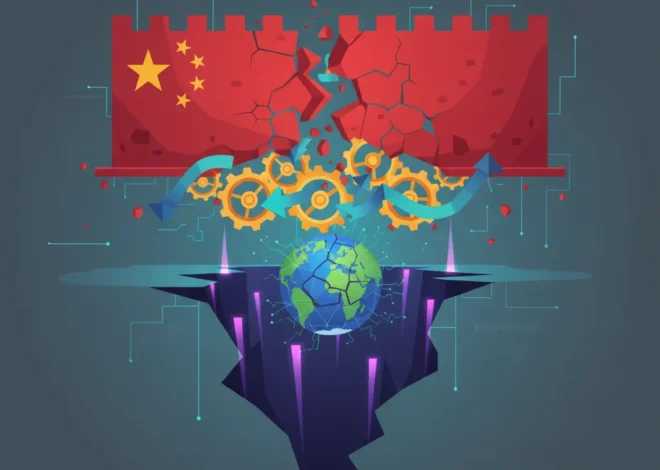
The Collateral Damage of the Tech Cold War: What a Failed Spy Case Reveals About US-China Economic Strategy
In the high-stakes world of global economics and finance, headlines often focus on stock market fluctuations, new fintech innovations, or shifts in banking policy. Yet, sometimes the most significant indicators of future risk and opportunity lie hidden in plain sight, within the court documents of a single, seemingly isolated legal case. The recent collapse of the U.S. government’s prosecution of Gang Chen, a distinguished MIT professor, is one such event. It’s a story that extends far beyond the courtroom, offering a stark warning for investors, business leaders, and anyone navigating the turbulent waters of the modern global economy.
On the surface, the case was a clear shot in the escalating economic conflict between the United States and China. Professor Chen was arrested in January 2021 under the U.S. Department of Justice’s controversial “China Initiative,” a program launched to combat economic espionage and the theft of American intellectual property. He was accused of failing to disclose ties to Chinese government entities on his federal grant applications. The implications were explosive: a top mind at a prestigious U.S. institution allegedly compromised by a strategic rival. But a year later, the government’s case didn’t just lose; it disintegrated. Prosecutors abruptly dropped all charges, admitting they could no longer meet their burden of proof.
This reversal is not merely a legal footnote. It is a critical data point that reveals the profound complexities and potential pitfalls of America’s strategy to counter China. It forces us to ask difficult questions: How do we protect national security without stifling the very innovation that fuels our economy? And what is the true cost of getting that balance wrong? For those in finance and investing, the answers have direct and material consequences.
The China Initiative: A Tool of Economic Security or a Blunt Instrument?
To understand the significance of the Chen case, one must first understand the context of the China Initiative. Launched in 2018, its stated purpose was to identify and prosecute those engaged in trade secret theft, hacking, and economic espionage for the benefit of China. In a world where competitive advantage is increasingly driven by technology—from financial technology and blockchain to artificial intelligence—protecting intellectual property is paramount to maintaining a robust economy.
However, the initiative quickly drew criticism for what many saw as a drift from its original mission. Instead of focusing on clear-cut cases of corporate espionage, a significant number of prosecutions targeted academics, often of Chinese descent, for alleged grant fraud or failure to disclose affiliations—charges far removed from the core threat of IP theft. According to his lawyer, Professor Chen’s case was a prime example of this overreach. Robert Fisher stated that the case was a “terrible mistake” and that Chen was a “loyal American who was never an agent for any foreign government.” (source).
The pattern of dropped cases and acquittals suggests a systemic issue, transforming a national security tool into a source of profound uncertainty and fear within the academic and research communities. This has tangible economic consequences.
Below is a comparison of the initiative’s intended goals versus its widely criticized outcomes, highlighting the strategic disconnect.
| Stated Goal of the China Initiative | Observed Outcome & Criticism |
|---|---|
| Combat Economic Espionage & IP Theft | A large portion of cases focused on grant and disclosure fraud in academia, not corporate spying. |
| Protect U.S. Research & Technology | Created a “chilling effect” on international scientific collaboration, a key driver of innovation. |
| Deter Malign Foreign Influence | Accusations of racial profiling alienated talented scientists and engineers of Chinese descent, creating a brain drain risk. |
| Provide Clear Deterrents for Illicit Activity | Vague and shifting enforcement standards created confusion and fear, discouraging legitimate academic partnerships. |
The Silence in the Market: Why a UK Property Slowdown is a Red Flag for the Entire Economy
The Ripple Effect: From the Lab to the Stock Market
The fallout from cases like Gang Chen’s extends far beyond university campuses. It creates ripples that impact the entire financial and economic ecosystem, influencing everything from investment decisions to corporate strategy.
Investing in an Era of Uncertainty
For investors, geopolitical risk has become a primary variable in any sophisticated financial model. The China Initiative, and its subsequent unraveling, injects a potent dose of this risk directly into the technology and research sectors. The stock market abhors uncertainty. When the government’s strategic priorities lead to high-profile, yet ultimately failed, prosecutions, it creates a volatile environment. Valuations for tech companies, which are heavily dependent on their R&D pipeline and ability to attract global talent, can be negatively impacted. Investors must now factor in the risk that their portfolio companies could lose key personnel or face disruptions to critical research partnerships due to policy-driven anxieties.
A Dilemma for Corporate Finance and Strategy
Business leaders are caught in a strategic vise. On one hand, the U.S. government demands vigilance against Chinese influence. On the other, China remains a critical market, a vital part of the global supply chain, and a source of immense talent. Navigating this requires a delicate balancing act. Corporate finance departments must now allocate resources to enhanced compliance and due diligence, while strategists must game out scenarios of escalating economic decoupling. The vague enforcement standards seen in the China Initiative make this risk management exercise incredibly difficult. Do you sever ties with a Chinese university on a promising joint venture, or risk being caught in a geopolitical dragnet? This is the new reality of international business and banking.
This tension is particularly acute in the world of financial technology, where global collaboration is the norm. The development of cross-border payment systems, decentralized finance (DeFi) platforms built on blockchain, and AI-driven trading algorithms often involves teams and knowledge from around the world. Stifling this collaboration puts U.S. firms at a competitive disadvantage.
The North Sea Shift: How the UK's New Energy Reality is Reshaping the Economy and Your Investments
Recalibrating Strategy: Beyond a “National Threat”
The collapse of the Chen case and others like it has forced a necessary reckoning. In the wake of the controversy, the Department of Justice announced it was ending the “China Initiative” brand and re-evaluating its approach. The new strategy promises a broader focus on threats from a range of hostile nations, while also being more sensitive to the risks of discrimination and academic chilling effects.
This is a positive step, but the underlying challenge remains. The U.S. economy is in direct competition with China, and threats of economic espionage are real. A successful long-term strategy cannot be built on fear and broad-stroke accusations. Instead, it must be rooted in precision, evidence, and a clear understanding of the trade-offs.
An effective approach would involve:
- Targeted, Evidence-Based Enforcement: Focusing resources on clear instances of corporate espionage and IP theft rather than broad investigations into academic affiliations. This protects the economy without harming the innovation ecosystem.
- Clear Guidelines and Safe Harbors: Providing universities and corporations with explicit rules for international collaboration and disclosure. This reduces uncertainty and allows legitimate partnerships to flourish.
- Investing in Domestic Strength: The ultimate defense against economic competition is to out-innovate. This means robust federal funding for R&D, investing in STEM education, and ensuring the U.S. remains the most attractive destination for global talent. As U.S. Attorney for Massachusetts Rachael Rollins stated when dropping the charges, her office has a responsibility to “promote a climate of academic integrity and intellectual freedom” (source). This is not just a legal principle; it is a cornerstone of sound economics.
Strategic Deployment: What a National Guard Presence in Chicago Teaches Us About Financial Fortitude
Conclusion: Finding Balance in the New Economic Cold War
The case of Professor Gang Chen is a cautionary tale. It demonstrates that in the complex interplay of national security, economics, and innovation, blunt instruments often do more harm than good. A strategy that alienates the very talent needed to compete is a strategy that is destined to fail. For the finance professional, the investor, and the business leader, this story serves as a powerful reminder that headline geopolitical conflicts have real-world costs that can impact a balance sheet, a stock price, or an R&D timeline.
As the U.S. recalibrates its approach to China, the path forward must be one of strategic clarity and balance. It must be tough on genuine threats while remaining open to the global flow of ideas and people that has long been the engine of the American economy. Getting this right is essential to ensuring continued leadership in everything from banking and trading to the next generation of financial technology.


